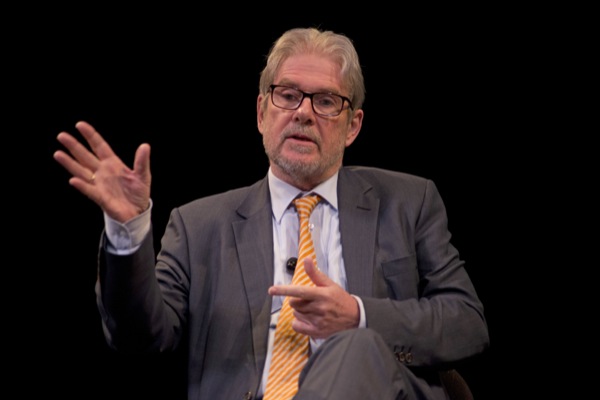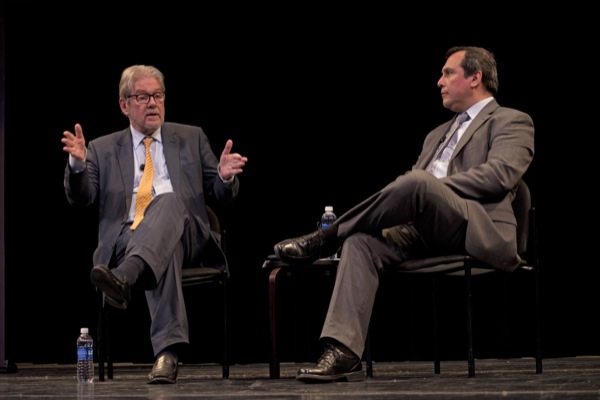Global Agenda
Latin American progress will continue, but at a slower rate, expert says
12:01 p.m., May 2, 2014--In a region that is often overlooked and currently faces some unrest, economic progress has been significant in the last decade, an expert on Latin America told a University of Delaware Global Agenda audience Wednesday night, April 30, in Mitchell Hall.
Michael Reid, writer of the Bello column on Latin America for The Economist and writer-at-large for the region, spoke on the topic, “Latin America Today.”
Global Stories
Fulbright awards
Peace Corps plans
When looking at recent economic, political and social development of Latin America, one notes significant improvement, but it is also true that “what is in front of your nose is a constant struggle,” said Reid.
Reid spent 15 of the last 20 years in Latin America and his reporting career includes work as a correspondent in Mexico, Brazil and Peru.
Demographic change
The third greatest region of democracy is unjustly neglected and ignored, said Reid, noting that people are struggling to fight for democracy in countries such as Venezuela and Brazil.
Latin America is seeing a rise of the middle class. Extreme and moderate poverty are both on a downward trend while gross domestic product is on the rise.
The middle class expanded 50 percent in the six years between 2003-09, and a large portion of the region has left poverty. The challenge will be to maintain these numbers and not slip back into poverty, said Reid.
Reid said the region has had an impressive increase in middle class, but “there is a lovely scar of extreme differences of income.”
According to Reid, Latin America is much less vulnerable than in the past. International reserves have quadrupled, and the region’s financial systems are strongly capitalized and regulated.
One drawback to this potential success is slow economic growth due to lower levels of trade caused by the economic slowdown in China. The danger is that the region will settle for years of mediocre growth that would not help improve, or even maintain, the recent gains.
“Latin American countries will have to rely on productivity, innovation and creativeness,” said Reid.
A region of unrest
Reid discussed unrest and the opposition movement in Venezuela as citizens demand more democracy in that nation, and he also analyzed Brazil’s foreign policy. He speculated that a loss of the ruling party in the upcoming presidential elections in Brazil could have significant geo-political consequences in the region.
Structural reform is back on the political agenda of the regions. There is a lack of citizens’ security and a high amount of extortion and organized crime. According to Reid, real progress means a coordinated effort including, police, judges and the people as fear of violence can undermine the region’s progress.
“(Latin America) is going to face bigger challenges, and not all the countries will sustain progress -- some will, but some can’t,” said Reid. “Those countries that do things better will perform better.”
Potential, and room for improvement
Reid argued despite some drawbacks, the region has potential.
A poor transport infrastructure can be modernized. Currently, freight costs are hindering export trade. Reid mentioned that a study showed that shipping costs from Central America to the U.S. can be more expensive than from China. “That is insane,” he remarked.
Also, he said that greater taxes, and better productivity, can be achieved by reducing the number of people engaged in the informal economy.
Productivity can be improved with education. A poorly educated work force hinders opportunities, and according to Reid it will take many years for Latin American counties to catch up.
“Education is inevitably linked to innovation,” said Reid. “The region still has enormous scope to grow upon.”
Global Agenda: The class
Students in the Global Agenda class, POSC/COMM 444, to which Reid spoke prior to the evening lecture, learned of how his career took him from London to Lima.
“It is always great to work with students,” said Reid. “I was from a generation that was uncooperative and rebellious, and I found these students interesting and polite.”
Students were fascinated by Reid’s ability to manage and figure out a way to make a job work for him, no matter where he lived.
“We all want to travel,” said Melissa Verlaque, a history and international relations double major. “It would be incredible if we could make it work like he did.”
“Just the fact that he went from London to Peru to work -- I admire someone that adventurous,” said Audrey Wright, an economics major.
Alec Nathan, a mass communication major and aspiring journalist, was struck by the fact Reid told the class that in London they “don’t study journalism, they practice it.”
“I thought it was encouraging that he didn’t know what to do out of college, but he still pursued his passion and made a career out of it,” said Nathan.
Throughout the speaker series, students have examined and explored how regional responses to global pressures play out in today’s world. Despite differences in cultures and values represented in the regions, many share the same trials and triumphs of navigating through issues such as of poverty, public opinion, unrest, leadership, and development.
The students in the Global Agenda class have not only explored these topics and perspectives, but said they have gained insight from the one-on-one experiences with the speakers. Today, these speakers are recognized for their work, while it is often hard for students to predict where their careers will lead after graduation.
The component of the unknown was a similar feeling for the speakers who shared the stories of their personal careers. None of them predicted they would be in the positions they are today, which many of the students said they were grateful for hearing.
The classroom visit and presentation by Reid was the last in the 2014 Global Agenda series.
Article by Elizabeth Adams
Photos by Duane Perry












